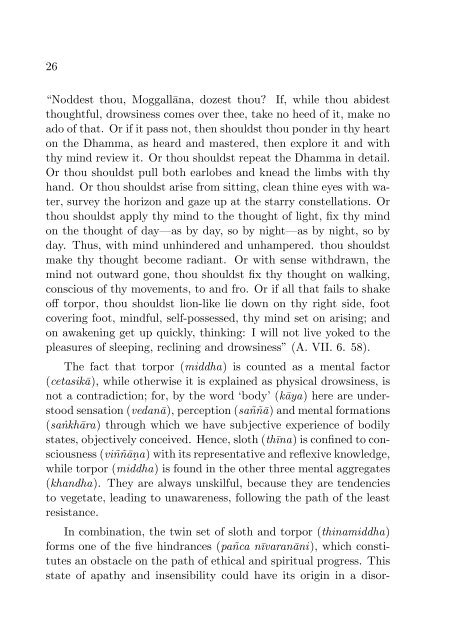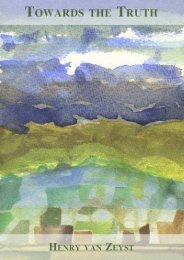Agony and Ecstasy
A comparative study of the five hindrances, together with the five states of concentration or mental absorption.
A comparative study of the five hindrances, together with the five states of concentration or mental absorption.
You also want an ePaper? Increase the reach of your titles
YUMPU automatically turns print PDFs into web optimized ePapers that Google loves.
26<br />
“Noddest thou, Moggallāna, dozest thou? If, while thou abidest<br />
thoughtful, drowsiness comes over thee, take no heed of it, make no<br />
ado of that. Or if it pass not, then shouldst thou ponder in thy heart<br />
on the Dhamma, as heard <strong>and</strong> mastered, then explore it <strong>and</strong> with<br />
thy mind review it. Or thou shouldst repeat the Dhamma in detail.<br />
Or thou shouldst pull both earlobes <strong>and</strong> knead the limbs with thy<br />
h<strong>and</strong>. Or thou shouldst arise from sitting, clean thine eyes with water,<br />
survey the horizon <strong>and</strong> gaze up at the starry constellations. Or<br />
thou shouldst apply thy mind to the thought of light, fix thy mind<br />
on the thought of day—as by day, so by night—as by night, so by<br />
day. Thus, with mind unhindered <strong>and</strong> unhampered. thou shouldst<br />
make thy thought become radiant. Or with sense withdrawn, the<br />
mind not outward gone, thou shouldst fix thy thought on walking,<br />
conscious of thy movements, to <strong>and</strong> fro. Or if all that fails to shake<br />
off torpor, thou shouldst lion-like lie down on thy right side, foot<br />
covering foot, mindful, self-possessed, thy mind set on arising; <strong>and</strong><br />
on awakening get up quickly, thinking: I will not live yoked to the<br />
pleasures of sleeping, reclining <strong>and</strong> drowsiness” (A. VII. 6. 58).<br />
The fact that torpor (middha) is counted as a mental factor<br />
(cetasikā), while otherwise it is explained as physical drowsiness, is<br />
not a contradiction; for, by the word ‘body’ (kāya) here are understood<br />
sensation (vedanā), perception (saññā) <strong>and</strong> mental formations<br />
(saṅkhāra) through which we have subjective experience of bodily<br />
states, objectively conceived. Hence, sloth (thīna) is confined to consciousness<br />
(viññāṇa) with its representative <strong>and</strong> reflexive knowledge,<br />
while torpor (middha) is found in the other three mental aggregates<br />
(kh<strong>and</strong>ha). They are always unskilful, because they are tendencies<br />
to vegetate, leading to unawareness, following the path of the least<br />
resistance.<br />
In combination, the twin set of sloth <strong>and</strong> torpor (thinamiddha)<br />
forms one of the five hindrances (pañca nīvaranāni), which constitutes<br />
an obstacle on the path of ethical <strong>and</strong> spiritual progress. This<br />
state of apathy <strong>and</strong> insensibility could have its origin in a disor-

















